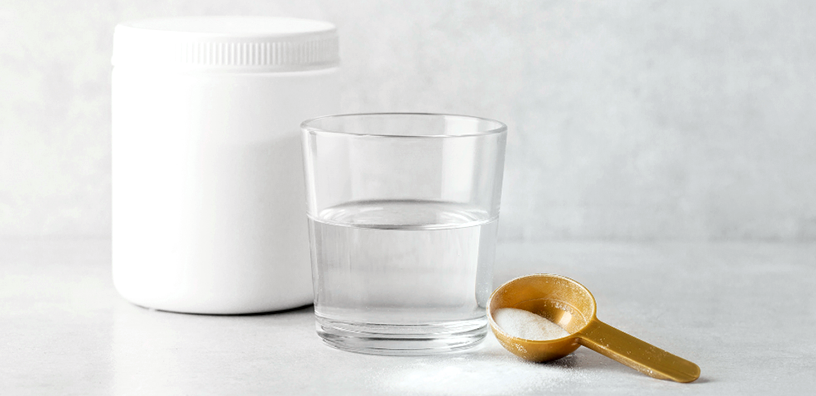Collagen has gained major popularity over the last few years, mainly in part of wellness aficionados and bloggers boasting about the benefits of collagen, all while looking youthful and glowing.
It’s not surprising, either. A lot of the world is looking for the secret to eternal youth and there’s a reason why they can’t stop promoting collagen.
Due to the fact that collagen makes up so many critical parts of the body, collagen is both essential and beneficial. But why?

What Is Collagen?
Collagen is the most abundant protein in the human body. It maintains strength and flexibility throughout the body and is considered the glue that holds your body together. In fact, the word collagen comes from the Greek word “kólla,” which means glue.[1]
Full of amino acids such as Glycine, Proline, Hydroxyproline, and Arginine, collagen helps your body’s hair, skin, nails, and tissue stay as healthy as possible.[2]
3 Main Types of Collagen
While there are 16 total types of collagen, 80 to 90 percent of the collagen in your body consists of three major types — Types I, II, and III — each having a different structure and function.[3]
- Type I - This type of collagen is the most prevalent and accounts for 90 percent of your body’s collagen. It provides the structure to your skin, bones, fibrous cartilage, tendons, tissue, and teeth.- Type II - If you’re active and rely on your joints, Type II collagen is very important. This type of collagen is found in elastic cartilage, which cushions your joints.
- Type III - This type is typically found alongside Type I. It supports the structure of the arteries, organs, and muscles.

What Damages Collagen?
Collagen production naturally decreases as we age. Typically, by the age of 60, a considerable decline in collagen production is completely normal.
While some additional factors that cause a decline in collagen production are out of your control, such as autoimmune disorders and genetic changes, oftentimes not-so-great habits can diminish your collagen production as well. These include:
- Spending too much time out in the sun- Smoking
- High sugar consumption
When the integrity of the collagen declines, your skin loses elasticity, wrinkles can form, and joint cartilage can weaken.[4]
What Are Collagen Peptides?
Collagen peptides are a hydrolyzed form of collagen. They are made from the same amino acids as collagen, however, collagen peptides are more easily absorbed by the body.[5]
Collagen peptides come mostly in the form of powder and can be added to almost anything — water, smoothies, your morning coffee, and even your favorite recipes. They are convenient and easy to use to supplement your body’s natural production of collagen.

Benefits of Collagen Peptides
The American Journal of Pathology conducted a study in 2006 which looked into collagen in people aged 18 to 29 years compared to people aged 80 years and older.
The results showed that older people had a 75 percent lower rate of collagen production than those in the 18 to 29-year range. Additionally, they found that our body’s ability to produce new collagen gradually decreases at a rate of one percent each year starting at 20-years-old.[6]
With astonishing results like this, it is no wonder that collagen supplements have become such a staple in many people’s daily routines.
So how does collagen exactly help us?
Improves Skin Health
Collagen is a major element of your skin. As we mentioned before, as we age our collagen depletes. This can lead to our skin showing early signs of aging, such as wrinkles, decreased elasticity, and dry skin.
Taking collagen supplements can rewind the clock and improve your skin’s health. Collagen aids in slowing the aging of your skin and promotes the production of proteins that help your skin’s structure.
Creams, lotions, and other topically applied skincare products that claim to contain collagen benefits tend to disappoint because they fail to reach the deeper layers of your skin. After taking collagen supplements, you’ll notice an improvement in your skin in terms of hydration, density, roughness, and elasticity.[7]

Promotes Hair & Nail Health
Collagen supplements can actually help hair in two different ways.
Amino acids help build keratin, the protein hair is primarily made up of, and three of those amino acids can be found in collagen. This keratin protein is a crucial part of the hair follicle and it needs these amino acids to grow.[8]
Collagen supplements can also help protect the hair from free radical damage. It also prevents hair thinning that happens with age, as well as hair loss.[9]
If your nails tend to peel, feel rough, and look ragged, collagen supplements can help improve them. Studies have shown that collagen can help improve the rate of nail growth and reduce the frequency of broken nails.[10]
Supports Healthy Joints
When collagen in the body decreases, you could potentially be more prone to developing degenerative joint disorders, such as osteoarthritis.
While exercise is an important activity for our health, continuous and strenuous exercise can result in strain on your body, especially joints. Collagen supplements, however, can help support your overall joint health by reducing inflammation and relieving pain in the body.
The amino acids in collagen are what helps with athletic recovery and overall healthy joints. Glycine aids in lubricating joints, which increases mobility. Proline and lysine aids in strengthening ligaments and tendons.[11,12]

Where to Buy Collagen Peptides
Health doesn’t need to be complex, so we’re making it easier for you with superior quality products with natural, simple ingredients — delivered right to your door. Our premium products are made with the consumer in mind, no matter how active or busy your lifestyle is.
Our Collagen Peptides Powder comes with all of the benefits, and none of the fillers. Easily blend this powder into your lifestyle and soak in all the perks of Type I & III hydrolyzed collagen peptides.
Ready to check it out yourself? Click here to shop!
References
|






Comments (1)
I’m on my first container of your product. I’m 67 and starting taking this product for my skin and hair. I didn’t even notice it was for joint pain. All of a sudden I didn’t have the joint pain in my knees, knuckle and elbows. Omg I am so thankful for your product. I can wake up and my knees don’t hurt. I am old school and always thought I needed to go to the doctor for prescribe medicine. Your product has made me a believer in supplements. Thank you soooo much.